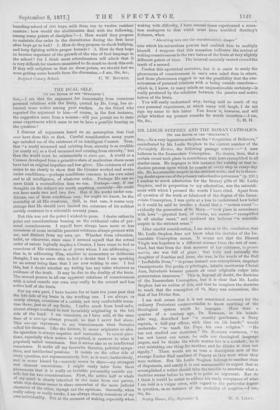THE DUAL SELF.
[TO THE EDITOR OF THE "EPEOTATOR:"]
SII1,—I see that the argument for immortality from conscious personal relations with the Deity, quoted by Mr. Greg, has at- tracted some notice among your readers. As the friend who repeated the argument to him—of course, in the first instance, the suggestion came from a woman—will you permit me to state some experiences which seem to me to have a possible bearing on the question ?
I distrust all arguments based on an assumption that God mast have done this or that. Careful consideration many years ago satisfied me of the existence of an intelligent Creator. True, that "a world uncaused and existing from eternity is as credible or nearly so] as a God uncaused and existing from eternity," but then the world must be substantially is stotu quo. A world or a Cosmos developed from a primitive state of motionless chaos must have had an original impulsor and law-giver. The existence of evil seems to me clearly to show that the Creator worked and works under conditions,—perhaps conditions common to his own mind and to all intelligence, of whatever order. Perhaps He can no more think a contradiction than we can. Perhaps—nay, if our thoughts on the subject are worth anything, certainly—He could not have made two and two five. But if He works under con- ditions, one of these conditions may, for aught we know, be the mortality of all His creatures. Still, in that case, it seems very strange that He should have limited the existence of his noblest earthly creatures to a miserable seventy years.
lint this was not the point I wished to press. I desire rather to point out considerations bearing on the evidential value of per- sonal consciousness. I myself have always been more or less conscious of some invisible personal existence always present with me, and distinct from my own ego. Whether from education, habit, or otherwise, since once I assured myself that the actual order of nature logically implies a Creator, I have come to feel as conscious of His existence as of yours whom I am addressing,— that is, in addressing Him, whether in momentary or deliberate thought, I am no more able to feel a doubt that I am speaking to an actual being than that I am now writing to one. I feel this, but I doubt whether my feeling has any value whatever as evidence of the truth. It may be due to the duality of the brain. The second person in all our apparent relations of consciousness with a mind outside our own may really be the second and less active half of the brain.
For my own part, I have known for at least ten years past that the left side of my brain is the working one. I fun always, or nearly always, conscious of a certain not very confortable sensa- tion there, just as of my limbs. I suffer much from head-ache, almost always confined to and invariably originating in the left side of the head. I am conscious, as I have said, at the same time of a non-ego always present, so that I never feel alone. This non-ego represents to my consciousness what Socrates called his cimmon. Like the &omen, it never originates an idea. Its operation is always negative and corrective. In moral ques- tions, especially when action is required, it answers to what is popularly called conscience. But it serves also as an intellectual conscience. It snubs all my favourite theories, political sympa- thies, and intellectual passions. It insists on the other side of every question, not argumentatively, but, as it were, instinctively, and is never biased by—scarcely seems to share—my strongest and clearest convictions. I might easily infer from these phenomena that it is really an invisible personality outside my- self, but for two considerations, First, the active half or whole of may mind is clearly inherited in the main from one parent, svhile this &salon seems to share somewhat of the more judicial character of the other, though not the opinions. Secondly, when really asleep or really awake, I am always clearly conscious of my own individuality. But at the moment of waking, especially when
waking with difficulty, I have several times experienced a sensa- tion analogous to that which must have troubled Southey's Kehama, when "Absorbing into one the consubstantisto shapes" into which his miraculous powers had enabled him to multiply himself. I suppose that this sensation indicates the revival of waking consciousness in the two halves of the brain at very slightly different points of time. The interval certainly cannot exceed the tenth of a second.
Pardon this egotistical narrative, but it is easier to study the phenomena of consciousness in one's own mind than in others, and these phenomena suggest to me the possibility that the con- sciousness of personal relations with a being outside ourselves— which is, I know, to many minds an unquestionable certainty—is really produced by the relations between the passive and active halves of the brain.
You will easily understand why, having said so much of my own personal experiences, at which many will laugh, I do not sign my name to this letter. You know it, however, and will judge whether my present remarks be worth insertion.—I am,






























 Previous page
Previous page